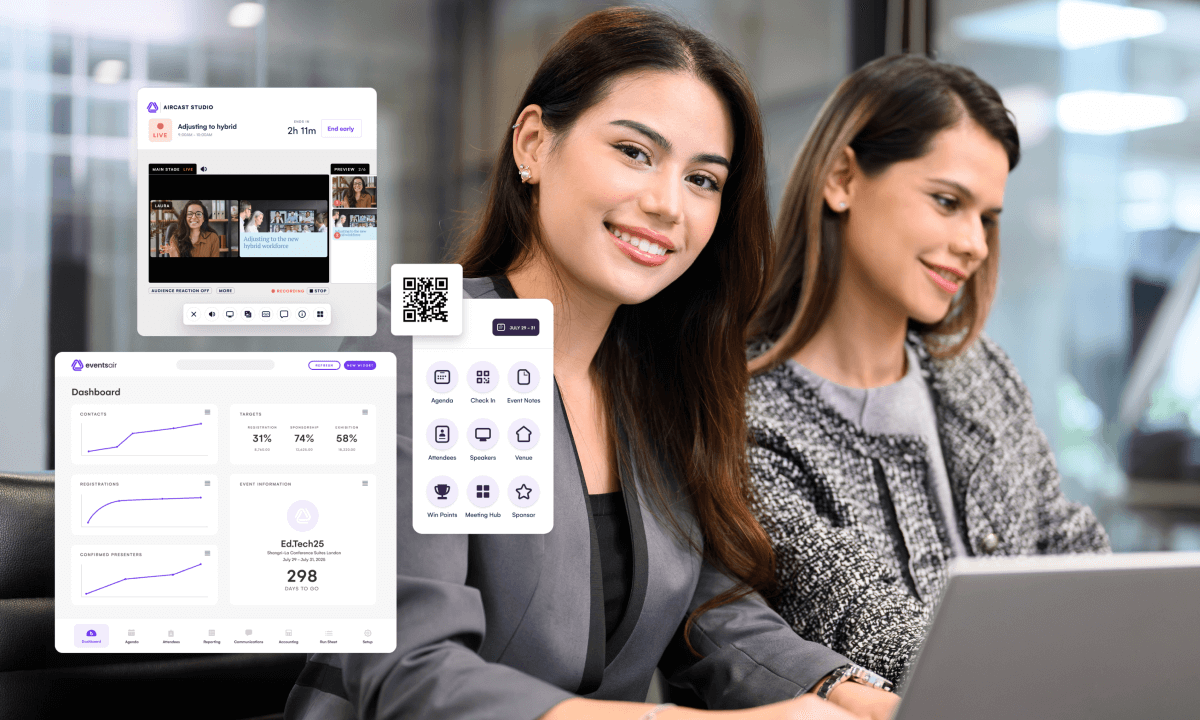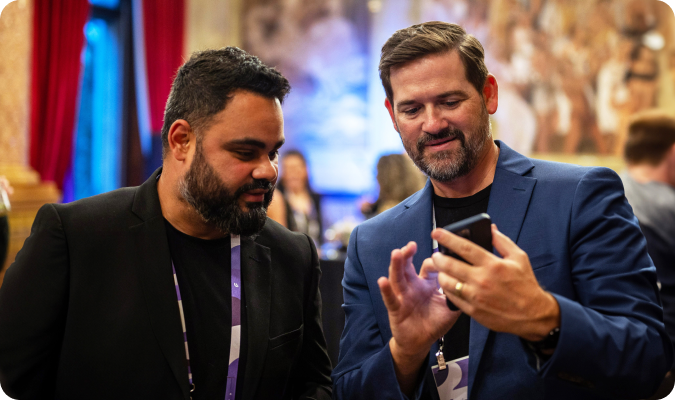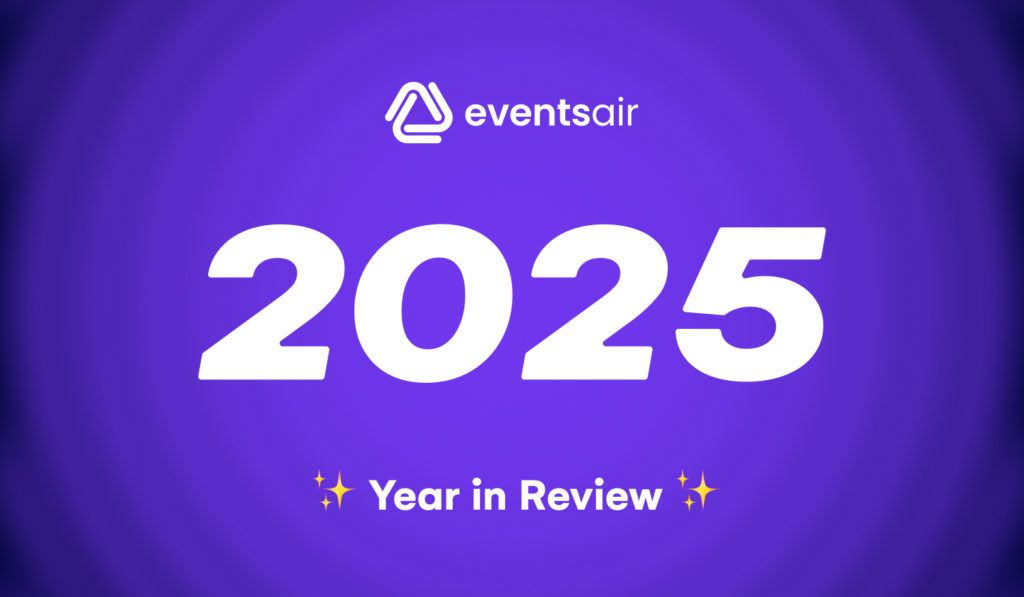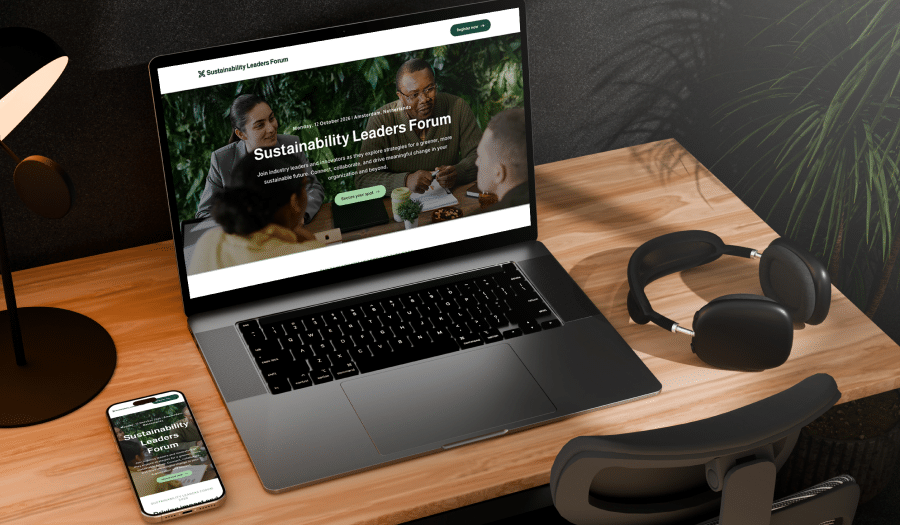
Once upon a time in the events industry, paper was king, and “technology” was simply a tool that facilitated the use of paper. Fast forward to today, and there’s a whole wide world of event planning technology tools – from software and digital resources, to hardware, gadgets, and devices that not only reduce (or eliminate) the need for paper, but (claim to) enhance, overhaul, or optimize almost every aspect of the event planning and attendee experience.
But with so many tools out there, how do you know which are worth investing time and money into and which are better left alone? In this post, we’ll be putting the latest event planning technology trends under a microscope to help you differentiate between the weird, the wonderful, and what actually works!
How has technology changed the event industry?
Imagine planning and running an event without a website for attendees to register through, without digital channels for promotion, or without event management software to store the data, manage seating plans, and all the other details?
An interested customer would need to call to register, the person on the other end would have to painstakingly note down the details, and payment would be old school – cheque or cash. There would be no email reminders, no calendar alerts, no pre-event or social media hype; the attendee would simply turn up on the day, attend the sessions, and maybe do some networking. And the “post-event analysis” was likely little more than the number of registrations and attendants.
Simpler times, but not necessarily easier times. The introduction and proliferation of event planning and management tech, social and digital media, and artificial intelligence (AI) have completely revolutionized the event industry, improving efficiency, accessibility, and the overall experience for both organizers and attendees. Leaders in this space are finding new ways to innovate and wow their audiences, while those slow to adapt risk being left behind.
What are the benefits of technology in event planning?
Leveraging event planning technology tools in the planning, launch, and post-event phases has a range of benefits that contribute to successful and memorable events. Here are some key advantages:
- Improved organizational efficiency through automation (e.g., email comms), streamlining processes (registration and ticketing), and reducing manual work.
- Enhance attendee experiences through mobile event apps, interactive tools and activations, virtual and hybrid events, and augmented reality/VR.
- Expanded reach and diverse audiences through social media and promotion tools, virtual and hybrid events.
- Improved execution and decision-making through greater access to data and more sophisticated event analytics.
- Extended content lifecycle through on-demand and repurposed content
What are the top event planning technology trends?
Remaining at the forefront of emerging event technology trends is vital for event planners and marketers who want to stay competitive.
In 2024 and beyond, we’ll see a new era of seamless and immersive event experiences; AI will redefine what’s possible, VR will let attendees experience the impossible, and so much more. Below are the top trends and our verdict as to whether they’re worth investing in, one to watch, or wait and see.
Smart wearables for an efficient, streamlined event experience
We’ve been using smartwatches and fitness trackers for years now, but could wearables be the next frontier in events? In the future we might see innovative eyewear from which attendees can view the agenda, other attendee’s names, or real-time captioning and language translation. For now though, we’ve got smart badges.
Smart badges like Badgee leverage RFID or NFC technology to enhance an attendee’s experience and collect data in a non-intrusive, passive way.
For attendees:
- Streamlined check-in and session tracking
- Easy exchange of contact info when networking
- Easy provision of their information when talking with exhibitors
- Gamification and interactive experiences
For organizer, exhibitor, and sponsor:
- Heat map foot traffic through the event
- Track attendance at sessions, exhibition stalls/booths, and attendee interactions to inform strategy and decision making
- Enhanced lead generation and follow-up
Our verdict: Worth it – Smart wearables have a lot of value for both attendees for a relatively low investment.
Holograms for enhancing attendee engagement
No longer the stuff of Star Wars, these 3D floating images are now a reality and infiltrating the events space. Created by capturing and re-constructing light beams that have been scattered off an object using lasers, holograms can be used in a variety of creative ways to add an extra dimension (literally) to an event. For example:
- To include a speaker/s who are not physically present
- As a 3D live host
- To showcase products or services in exhibition booths
- As fun and dynamic brand activations
Our verdict: Wait and see. Holograms are outrageously expensive, so unless you have an outrageously large budget, then you might want to wait for the price to come down.
Biometrics for event check-in and tracking
Biometrics refers to biological or physical characteristics that can be used to identify a person, including fingerprints, voice, DNA, eyes/iris, and faces. With increasing security concerns and breaches over personal data, biometric authentication is a rapidly evolving space, and so too is the conversation around consent and data storage (which we’ll touch on in a minute).
To date, in the events space, we’ve only really seen facial recognition software used, with one corporate events awards company reporting 5 times faster check-in with facial recognition at their annual ICE Awards event in London. Some of the promoted benefits of such software include:
- Simple and efficient check-in for attendees – no tickets, barcode scanning, or queuing necessary
- Access control – improving the overall security of the event
- Attendee tracking – allowing behavioural analysis of an attendees movements e.g. which sessions were most popular, which stalls they visited, and for how long, which could enable personalized advertising and re-targeting.
Although this might sound good in theory, there are some important considerations regarding consent, privacy, storage, and use of the data. Obviously, using facial recognition for check-in would require attendees to provide a photo (which implies consent), but using any other sort of biometric tracking without their consent and the ability to opt-out can land you in hot water, like what happened with these retail stores in Australia.
Our verdict: One to watch. While the benefits sound appealing at first glance, it’s probably better to wait until some of the legal and regulatory kinks are ironed out before getting on board.
Virtual reality (VR) for increasing attendee connection and inclusivity
VR is certainly not new, but it will continue to grow in popularity, enabling immersive, interactive events – both in person and virtual – that attendees from anywhere in the world can participate in.
Attendees can explore life-like event venues, interact with virtual exhibits, and engage in networking opportunities, fostering a sense of presence and connection. From virtual keynote presentations to 360-degree event tours, event planners will harness its potential to create accessible, inclusive and unforgettable experiences that go beyond the confines of physical venues.
Our verdict: Worth it. This is a great one for sponsors and exhibitors to take advantage of as, depending on what you do with it, it can be a relatively inexpensive way to engage and delight attendees, and can be re-used across multiple events.

What technologies do event planners use?
As technology continues to shape and reshape the events landscape, staying ahead of the curve has never been more crucial, but with so much out there it can be easy to feel overwhelmed. In this section, we’ll explore the main technological innovations that event professionals are already using to plan, host, and evaluate all sorts of events.
Event management software
Event management software is arguably the most important technology tool of modern-day events. It takes the headaches out of event planning with various features to help you plan and promote your event, build anticipation and communicate with attendees in the lead up to the event, such as:
- Task lists and project management tools
- Budgets and income tracking
- Inventory control
- Seating plans
- Registrations, payments and ticketing
- Event websites
- Marketing and email communications
- Attendee management tools (e.g. travel and accommodation)
- Speaker assets (e.g. presentations, videos, bios, abstracts)
- Sponsorship and exhibitor tools
On top of that, event management software can help you manage the activities you’ve planned during the actual event.
- On-site check-in
- Access control
- Program management
- Run sheets
- Event app
- Internal team comms
- Audience engagement tools (e.g. polls, surveys, gamification)
- Agendas and run sheets
- Virtual and hybrid platforms (e.g. OnAir)
- Lead capture for exhibitors
Of course, as a professional event planner, you know the work doesn’t stop just because the main event is over. There are a lot of responsibilities post-event such as collating survey results, following-up your attendees, giving an analysis report, and so much more. All of these can be easily done through an event platform, as it takes advantage of technology to make your event planning life a whole lot easier.
Did you know EventsAir can do all of the above and more? Discover how our tools for pre, during, and post an event can work for your organization.
AI for Events
Of course, technological advancement will never be complete without a discussion of AI. The integration of AI in events has not resulted in widespread job losses, as some may have predicted, but rather has augmented human capabilities, automating routine tasks and allowing event professionals to focus on strategic decision-making, creative aspects, and delivering enhanced experiences for attendees (i.e. the things we love doing!).
4 advantages of using AI for events
- Streamline processes: Top AI tools streamline and automate tasks, saving time for event planners.
- Enhance the attendee experience: Personalization through AI offers tailored recommendations, creating a more engaging and personalized event atmosphere.
- Improve decision-making: AI tools provide powerful analytics, facilitating data-driven decisions for event optimization.
- Idea generation: Whether it’s the name of your event, theme, or brand activation, AI is a versatile tool for brainstorming new ideas and building on existing ones.
Practical ways to leverage AI for events
Before we explore some of our favourite tools and ways to leverage AI, it’s important to note that AI, on its own, isn’t a cure-all. It needs a clever and critical human brain (aka you) who knows its limitations and how to get the most out of it. Here are some guidelines we like to follow at EventsAir.
- Ideation – great for generating ideas.
- Customize – avoid copy and pasting generic content, rather tailor and edit responses.
- Train the bot – you get out what you put in!
- Adapt the tone – provide clear tone of voice guidelines.
- Validate – AI is far from perfect and is often inaccurate.
SPARK Spark Lab and AI Resources
SPARK is PCMA’s free AI tool for event planners, helping with event ideation, content generation, and marketing communications.
ChatGPT for event marketing
If you haven’t heard of ChatGPT by now, you must have been living under a rock. Despite its imperfections (refer to the guideline 5 above), ChatGPT serves as a valuable time-saving tool for event marketers. Here are several ways you can leverage the capabilities of ChatGPT.
- Create promotional emails
- Generate speaker bios
- Draft landing page and registration page content
- Develop social posts to promote events
- Draft video scripts for teasers
- Develop sponsorship prospectuses
- Generate content for event blogs, PR and articles
AI tools for multimedia creation
- Video generation: Synthesia can create high-quality videos in various languages.
- Imagery generation: Midjourney and Dall-E 2 offer visual inspiration and generate images from text.
- Slide decks: Beautiful.ai assists in crafting visually appealing slide decks.
- Event logo creation: Looka aids in the quick generation of event logos.
- Music generation: Create original music with Beatoven and royalty-free AI music for event videos with Soundraw.
AI chatbots for customer service
AI chatbots powered by simple AI trees are now helping event organizers and attendees get the answers they need, quickly. Here’s some of the common things chatbots are doing:
- Efficient support: Implement AI chatbots to provide quick answers to common queries, freeing up staff for more strategic tasks.
- Personalized recommendations: AI interprets data from an attendee’s profile or social media account, offering personalized recommendations on sessions, networking, and product interactions.
Bonus tip: Looking for an easy to use chatbot that can plug into your EventsAir website? Check out chatbot.ai.
RFID for sponsors
You are probably already using RFID to replace your event tickets and physical payments as they’re easier to organize, track, dispense (especially if your attendees have RFID bands or smart badges!). Now, you can use the same RFID technology to upgrade and level up your sponsorship experiences.
RFID provides faster sponsorship activation during the check-in process, which, in turn, increases engagement. This allows you to gather data on behalf of your sponsors without interrupting your clients.
Furthermore, this gives your sponsors more opportunities to play around with their events. They can become more creative with their raffles and polls which are operated by virtual participation or RFID taps.
Event Mobile Apps
Never underestimate the power of a mobile event app. With 78% of businesses that use an event app reporting it contributes to a positive event ROI, they not only boost on-site engagement, but many event-goers at large events like conferences have come to expect them. Here are some of the ways that event apps add value.
- For attendees:
- Simplified, personalized schedule (e.g. tracking favourite speakers and session topics)
- Targeted communication (e.g. push notifications for schedule modifications for sessions they’ve booked, speaker updates)
- Networking opportunities (e.g. match-making, exchange of contact details)
- Maps
- Fun and interactive experiences (live polls, Q&A)
- Offers and discounts
- For sponsors and exhibitors:
- Rotating and targeted/personalized ads
- Links to landing pages/offers
- Lead capture
QR codes
With QR codes celebrating their 20th birthday this year, it’s only fair to celebrate their impact on the events industry, providing quick access to event information like schedules and maps, digital content, elements like polls and promos, and personalized attendee experiences.
They’re a valuable tool in the modern event planner’s kit as they’re not only quick and easy to create, but they’re quick and easy to use for the consumer (gone are the days of typing a cumbersome URL into the web browser).
Live streaming
Live streaming your event (or parts of your event) can help boost your brand in a number of different ways:
- Expands your reach to existing fans who were not able to attend the event.
- Extends your reach to those who might otherwise not have been exposed to it (e.g., by encouraging your guest and staff to share or engage with your live stream to their contacts)
- Increases social media engagement with your page when people view the stream or use the hashtag.
- Provides additional value to those who are already engaged with your brand and may not have been able to attend.
Bonus points if you decide to implement multistreaming to enhance your audience reach even further.
Floor plan diagramming software
Floor plan software is a game-changing tool for planning event layouts. Apart from saving a heap of time, event planners love diagramming software because:
- 3D rendering capabilities enable detailed and accurate representations of various areas of the event, providing an immersive preview of how things will actually look.
- Drag and drop functions allow easy manipulation, experimentation and adjustment of layout options and elements.
- It’s easy to allocate space efficiently for various event elements/sessions.
- Visualizing the event space helps optimize traffic flow for a better attendee experience.
- Collaboration tools enhance communication and streamline the planning and approvals process.
Social media
Social media platforms like Instagram, Twitter and TikTok are essential tools for event marketers to build excitement, share content, and connect with the audiences in real-time.
Attendees play a crucial role in producing user-generated content by sharing event highlights, photos, and personal experiences – creating social proof that the event organizer can leverage on their own channels or through social walls at the event, for example.
When done well, social media not only boosts the event’s visibility, but also fosters a sense of community and enthusiasm, making attendees active contributors to the event’s overall success and impact, which ultimately contributes to more sales and return customers.
Conclusion
As you can see, there are lots of different event planning technology tools that you can incorporate into your events, many of which you’re probably already using, and some more accessible, valuable, and cost-effective than others.
Our top tip? Don’t try too many things at once! Either start small, or identify the gaps or needs within your team/for your event and start with the highest priority tech first, and if overhauling your event planning and management is a high priority, check out EventsAir.
At EventsAir, our powerful event management platform can help you with every stage of the event management process from pre-planning, to hosting, to follow-up. We have one simple mission: to help event planners deliver the WOW in their events with the world’s most powerful event management technology. We’ve delivered some of the world’s biggest events, and we’d love to help you too.
If you would like to understand how we can help you unleash the power of event planning technology for your team, then schedule a demo with one of our team members today.
Event Planning & Management | Event Technology & Apps
See EventsAir in action
Discover why 12,000+ event professionals trust EventsAir to deliver effortless events, every time.




